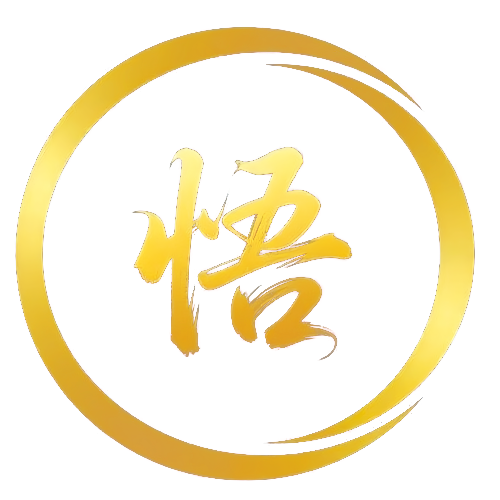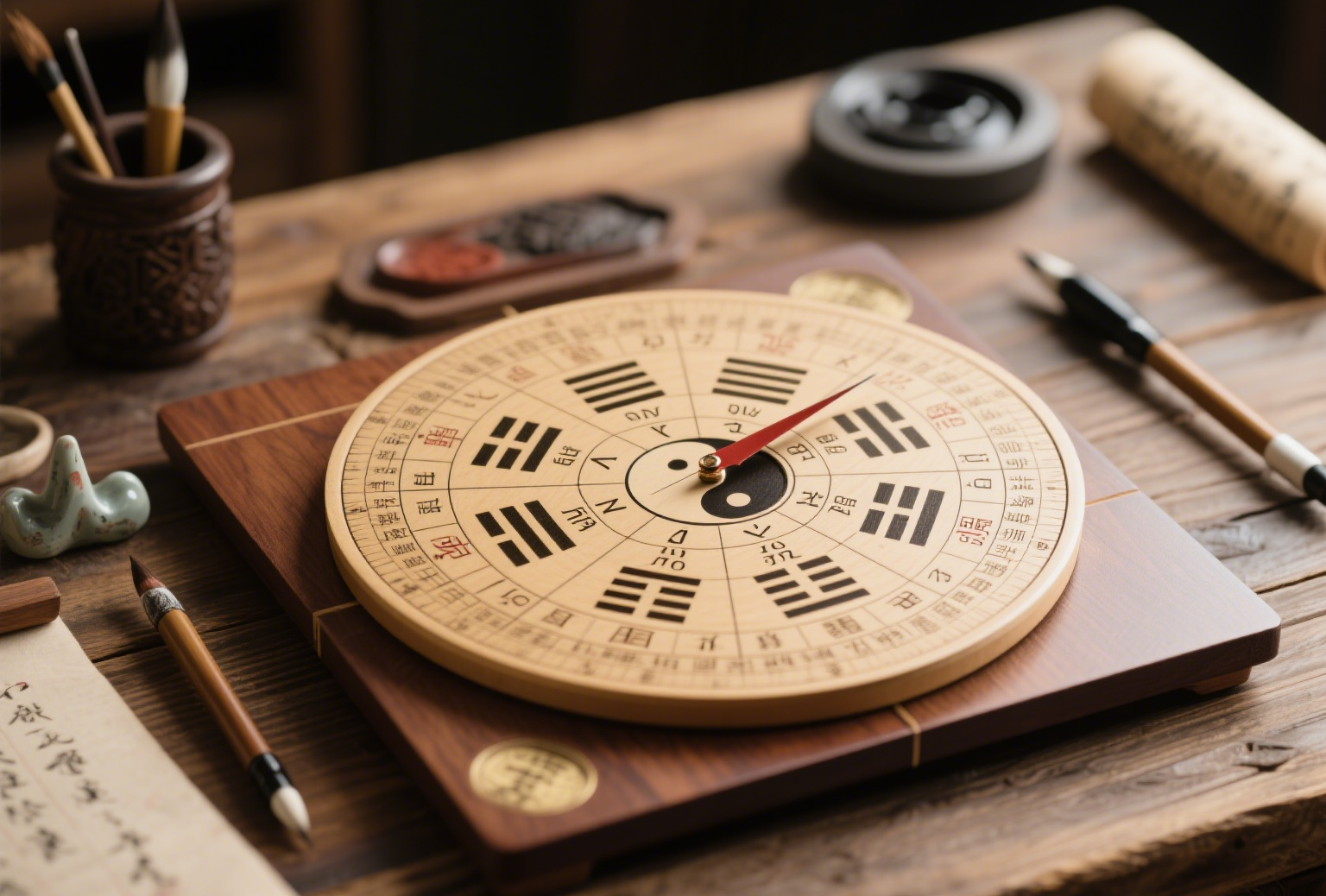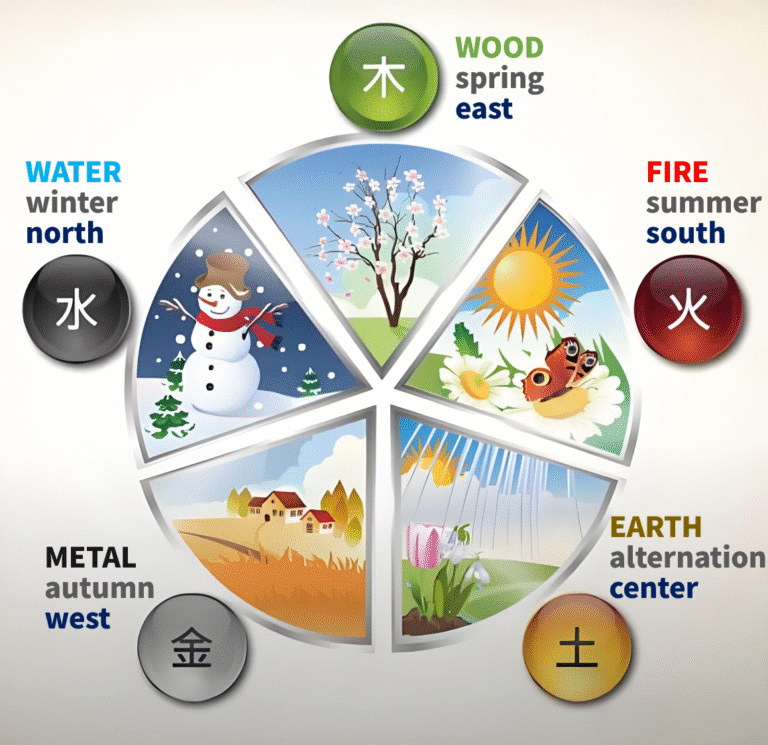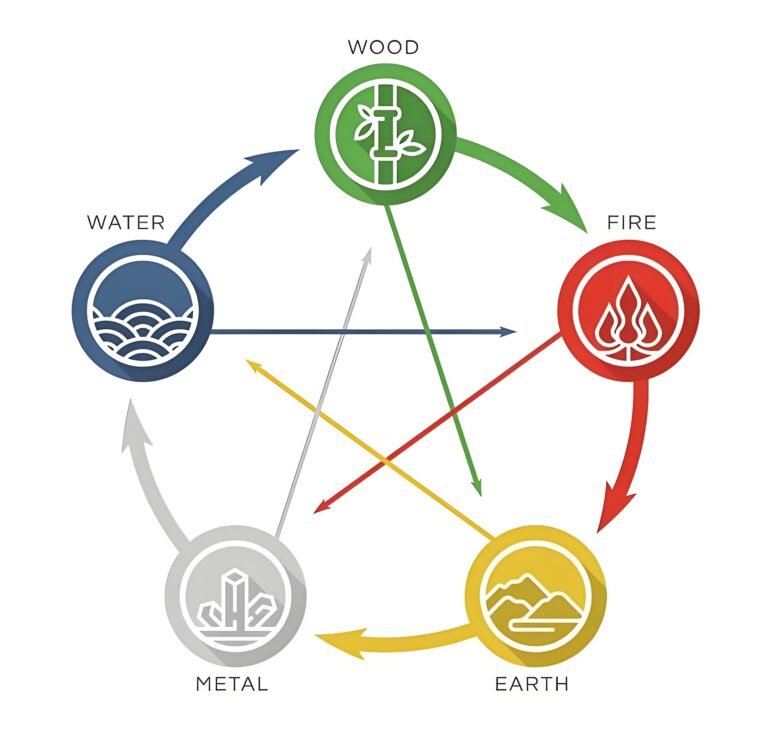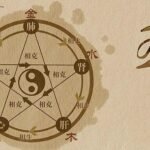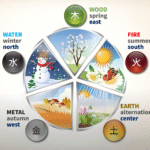In our first two articles, we unlocked the “energy code” of the Five Elements (Wood, Fire, Earth, Metal, Water) and their “interconnected web” linking seasons, directions, the body, and personality. Now, let’s explore how this ancient wisdom is used to understand personal destiny (Bazi) and shape our living environments (Feng Shui). The core principle remains the same: the balance and flow of energy (Wu Xing).
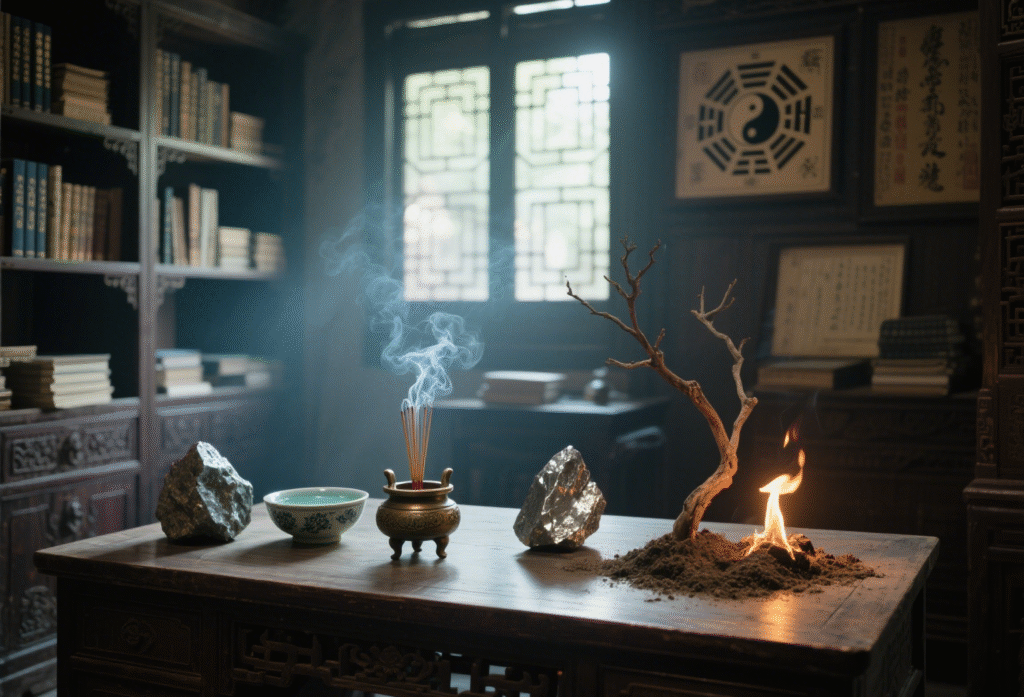
I. Wu Xing & Bazi Destiny Analysis: Your Personal “Energy Map”
Imagine that at the exact moment of your birth (year, month, day, hour), the distribution of the Five Elements’ energy in the cosmos is “frozen” to form a unique Four Pillars (Bazi) chart. This is like your innate “energy map” or “constitution report.” Analyzing this chart centers on understanding the relative strength (weak vs. strong) and interactions (Nourishing/Controlling cycles) of the Five Elements within it.
- The Ten Gods: The “Roles” Played by Elemental Energy
Within the Bazi chart, the elemental energy is assigned specific “roles,” known as the “Ten Gods,” representing different areas of life:- Metal: Direct Officer / Seven Killings – Symbolizes rules, career, responsibility, pressure, challenges. (Reflects Metal’s contracting, refining nature)
- Wood: Direct Resource / Indirect Resource – Symbolizes learning, wisdom, elders, protection, spiritual resources. (Reflects Wood’s growth, expansive nature)
- Water: Eating God / Hurting Officer – Symbolizes talent, creativity, expression, freedom, enjoyment. (Reflects Water’s flowing, intelligent nature)
- Fire: Direct Wealth / Indirect Wealth – Symbolizes wealth, material possessions, desires, action. (Reflects Fire’s heat, dynamic nature)
- Earth: Comparable Energy / Rob Wealth – Symbolizes self, siblings, friends, colleagues, competitors, shared resources. (Reflects Earth’s stable, nurturing nature)
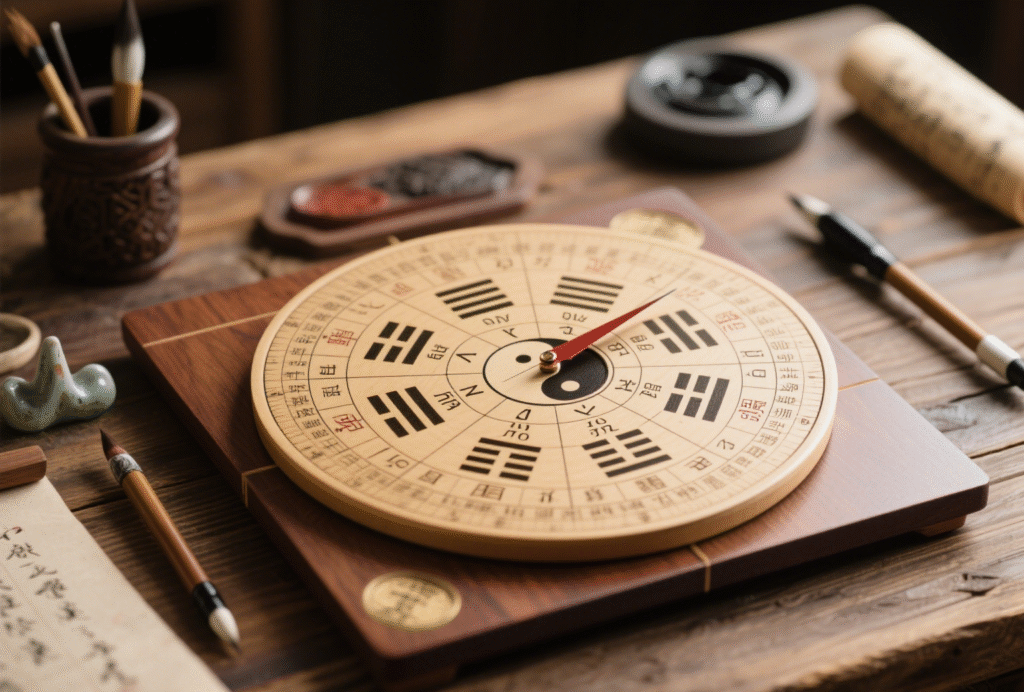
Simple Understanding: Whichever elemental energy is strong in your chart, its corresponding “role” (Ten God) has a greater influence. E.g., strong “Fire” (Wealth Star) might indicate a natural aptitude for earning money and strong drive; but excessive strength could lead to overwhelming desires.
- The Cycles: The “Flow” of Destiny’s Energy
- The Nourishing (Sheng) Cycle is the “Helper”: When energy in the chart forms a good Nourishing cycle, it often signifies smoother progress and resource transformation. For example:
- Wood Nourishes Fire: Talent/creativity (Water/Eating God/Hurting Officer) can effectively transform into wealth/action (Fire/Wealth Star).
- Fire Nourishes Earth: Passion and effort (Fire) can build connections and resources (Earth).
- Earth Nourishes Metal: Connections and resources (Earth) can help build a career and handle challenges (Metal/Officer/Killings).
- Metal Nourishes Water: Career pressure and rules (Metal) can hone wisdom and creativity (Water).
- Water Nourishes Wood: Wisdom and creativity (Water) can foster learning and growth (Wood/Resource Stars).
- The Controlling (Ke) Cycle is the “Challenger” or “Regulator”: Controlling relationships aren’t inherently bad. They represent challenges and constraints but also prevent energy from running wild. The key is balance:
- Metal Controls Wood: Career pressure (Metal) might limit learning or free expression (Wood), but can also force focus and growth. Imbalance (Metal too strong): Overwhelming pressure, stifled thinking.
- Wood Controls Earth: Strong self/ideas (Wood) might drain resources/connections (Earth), but can bring breakthroughs. Imbalance (Wood too strong): Conflict, lack of resources.
- Earth Controls Water: Practical constraints (Earth) might suppress inspiration (Water), but foster grounding. Imbalance (Earth too strong): Rigid thinking, lack of flexibility.
- Water Controls Fire: Too many ideas (Water) might scatter action/drain wealth (Fire), but prevent impulsiveness. Imbalance (Water too strong): Overthinking, unstable finances.
- Fire Controls Metal: Strong desires/action (Fire) might break rules/cause conflict (Metal), but can overcome obstacles. Imbalance (Fire too strong): Recklessness, legal/career pressure.
- The Nourishing (Sheng) Cycle is the “Helper”: When energy in the chart forms a good Nourishing cycle, it often signifies smoother progress and resource transformation. For example:
- Robust (Shen Qiang) vs. Weak (Shen Ruo) Constitution: Your “Energy Foundation”
- Robust Constitution: Means the dominant elemental energy in your chart (especially the Day Master element representing you) is strong and vigorous. Like a powerful car.
- Benefits from Control and Drainage (Ke/Xie): With ample energy, you can handle pressure/challenges (Officer/Killings/Metal controls) and enjoy expressing talent (Eating God/Hurting Officer/Water drains) or creating wealth (Wealth Star/Fire consumes). Appropriate “control/drainage” leads to achievement. E.g., strong “Wood” benefits from “Metal” (career pressure) for refinement, or “Fire” (action/earning) to use up energy.
- Weak Constitution: Means the dominant elemental energy (Day Master) is relatively frail. Like an underpowered car.
- Needs Support and Nourishment (Sheng/Fu): Requires energy replenishment (Resource Star/Wood nourishes) or help (Comparable/Rob Wealth/Earth assists). Too much pressure (Officer/Killings/Metal controls) or drainage (Wealth Star/Fire consumes, Eating God/Water drains) is overwhelming. E.g., weak “Metal” benefits from “Earth” (resources/connections) to strengthen it, or “Metal” (friends/help) to share the load.
- Robust Constitution: Means the dominant elemental energy in your chart (especially the Day Master element representing you) is strong and vigorous. Like a powerful car.
II. Wu Xing & Feng Shui: Crafting Your “Energy Space”

Feng Shui, at its core, uses the Five Elements’ energy in the environment (landforms, buildings, objects, colors, directions) to adjust the space’s Qi (energy field), making it more supportive of the occupants’ health, fortune, and well-being. The core principles remain: Balance, Flow, Harmony.
- Directions: The “Elemental Energy Fields” of Space
- East (Wood): Represents new beginnings, growth, family. Ideal for plants (Wood), a study (Wood governs wisdom).
- South (Fire): Represents fame, vitality, social life. Ideal for bright lighting (Fire), red décor (Fire), the living room.
- Center (Earth): Represents health, stability, the core. Keep clean, open, well-lit. Avoid clutter blocking energy (stagnant Earth).
- West (Metal): Represents career, children, harvest. Ideal for metal objects (Metal), white/gold (Metal), children’s room or workspace.
- North (Water): Represents career (fluid types), wisdom, wealth (flow). Ideal for water features (aquarium), black/deep blue (Water), quiet spaces (study).
- Objects & Colors: Activating Elemental Energy
- Need to Boost an Element? Introduce its corresponding items/colors:
- Boost Wood: Plants, wooden furniture, green/blue-green.
- Boost Fire: Lighting (esp. warm), candles, triangular shapes, red/purple/orange.
- Boost Earth: Ceramics, pottery, square shapes, yellow/brown.
- Boost Metal: Metal décor, clocks, circular/oval shapes, white/gold/silver.
- Boost Water: Aquariums, flowing water décor, wavy shapes, black/deep blue.
- Need to Calm an Overly Strong Element? Introduce the element that Controls or Drains it:
- Calm Excessive Wood: Use Metal (metal objects, white) or Fire (lighting, red) to Control/Drain.
- Calm Excessive Fire: Use Water (water features, black) or Earth (ceramics, yellow) to Control.
- Calm Excessive Earth: Use Wood (plants, green) or Metal (metal, white) to Drain/Control.
- Calm Excessive Metal: Use Fire (lighting, red) or Water (water features, black) to Control.
- Calm Excessive Water: Use Earth (ceramics, yellow) or Wood (plants, green) to Absorb/Drain.
- Need to Boost an Element? Introduce its corresponding items/colors:
- Flow & Balance: The Heart of Feng Shui
- Airflow (Qi) is Energy Flow: Keep spaces ventilated, well-lit, avoid dead-end clutter. Let energy (Qi) move smoothly (like the Nourishing Cycle).
- Avoid Extremes: A room full of Fire (bright red, strong light) causes agitation; full of Water (large black/blue areas, dampness) causes lethargy. Harmony is key (e.g., Water and Fire balanced: red accents with black, light with a water feature).
- Consider Personal Energy: Ideal Feng Shui often references the occupant’s Bazi elemental needs (e.g., someone whose chart benefits from Fire will find Fire elements in the South more supportive).

Conclusion: Wu Xing – The Key Connecting Destiny & Environment
- Bazi Destiny Analysis: Deciphers your innate “energy constitution” (Robust/Weak) and potential life trends (career, wealth, wisdom, relationships) by analyzing the Five Elements’ distribution (strength, cycles, Ten Gods) at your birth. The goal is self-understanding, allowing you to harmonize and balance your energy through conscious life choices (career, environment, relationships).
- Feng Shui: Identifies and adjusts the Five Elements’ energy (directions, objects, colors, layout) in your living/working space to create an environment with harmonious Qi and flowing energy, thereby supporting health, mood, and overall fortune. It’s a practice of using environmental energy to “nourish” or “regulate” personal energy.
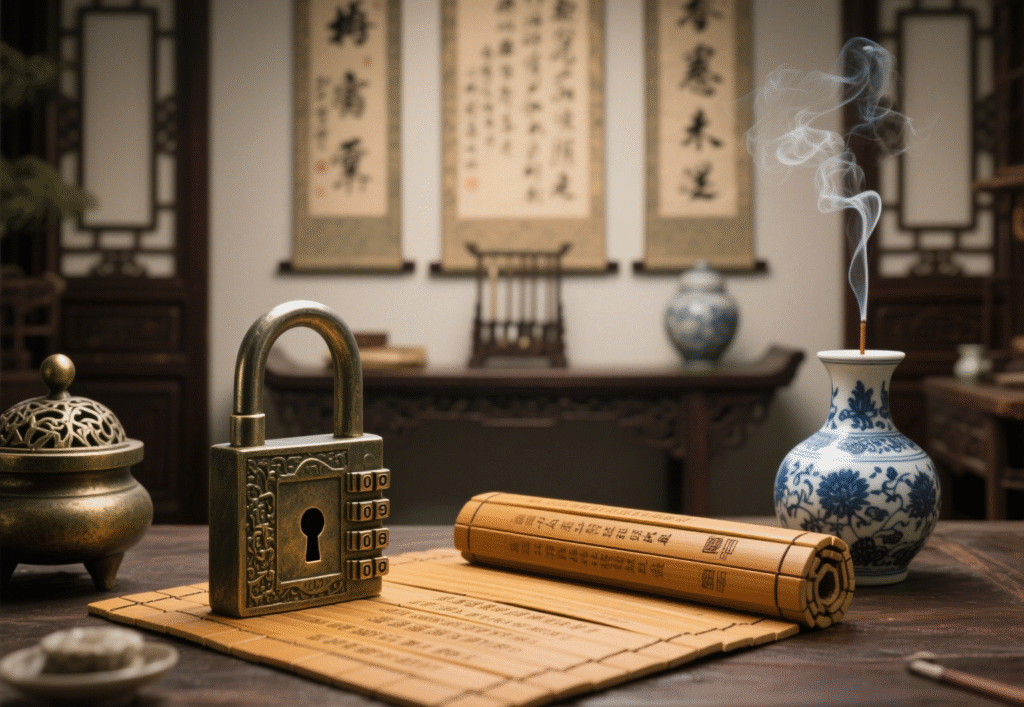
Whether interpreting the code of destiny (Bazi) or optimizing your living space (Feng Shui), the ancient wisdom of the Five Elements reminds us: Paying attention to the flow of energy and seeking dynamic balance is key to inner harmony and outer well-being. Understanding this “language of energy” gives you a powerful key to interpreting yourself and the world.
Which application – understanding destiny (Bazi) or shaping your environment (Feng Shui) – interests you more?

